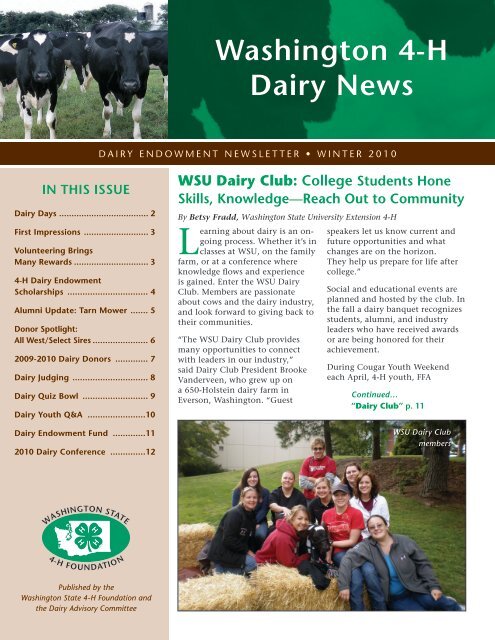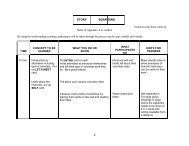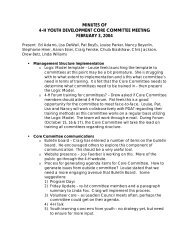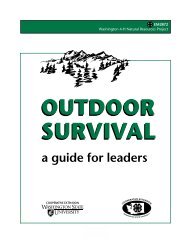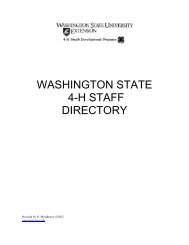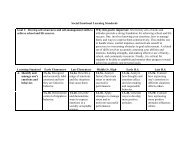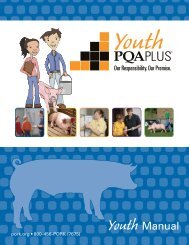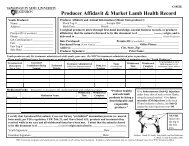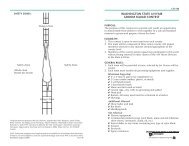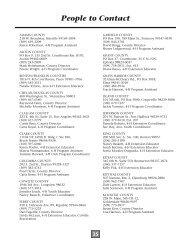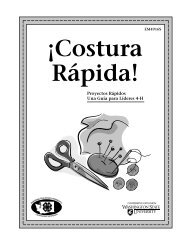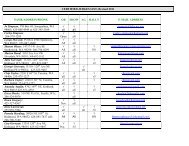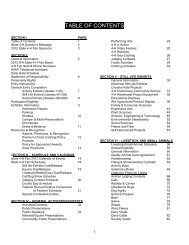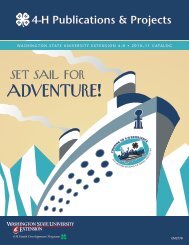Washington 4-H Dairy News - 4-H Youth Development Program ...
Washington 4-H Dairy News - 4-H Youth Development Program ...
Washington 4-H Dairy News - 4-H Youth Development Program ...
You also want an ePaper? Increase the reach of your titles
YUMPU automatically turns print PDFs into web optimized ePapers that Google loves.
IN THIS ISSUE<br />
<strong>Dairy</strong> Days .................................... 2<br />
First Impressions .......................... 3<br />
Volunteering Brings<br />
Many Rewards .............................. 3<br />
4-H <strong>Dairy</strong> Endowment<br />
Scholarships ................................ 4<br />
Alumni Update: Tarn Mower ....... 5<br />
Donor Spotlight:<br />
All West/Select Sires ...................... 6<br />
2009-2010 <strong>Dairy</strong> Donors ............. 7<br />
<strong>Dairy</strong> Judging .............................. 8<br />
<strong>Dairy</strong> Quiz Bowl .......................... 9<br />
<strong>Dairy</strong> <strong>Youth</strong> Q&A .......................10<br />
<strong>Dairy</strong> Endowment Fund .............11<br />
2010 <strong>Dairy</strong> Conference ..............12<br />
WASHINGTON STATE<br />
4-H FOUNDATIO N<br />
Published by the<br />
<strong>Washington</strong> State 4-H Foundation and<br />
the <strong>Dairy</strong> Advisory Committee<br />
<strong>Washington</strong> 4-H<br />
1<br />
<strong>Dairy</strong> <strong>News</strong><br />
D A I R Y E N D O W M E N T N E W S L E T T E R • W I N T E R 2 0 1 0<br />
WSU <strong>Dairy</strong> Club: College Students Hone<br />
Skills, Knowledge—Reach Out to Community<br />
By Betsy Fradd, <strong>Washington</strong> State University Extension 4-H<br />
Learning about dairy is an ongoing<br />
process. Whether it’s in<br />
classes at WSU, on the family<br />
farm, or at a conference where<br />
knowledge flows and experience<br />
is gained. Enter the WSU <strong>Dairy</strong><br />
Club. Members are passionate<br />
about cows and the dairy industry,<br />
and look forward to giving back to<br />
their communities.<br />
“The WSU <strong>Dairy</strong> Club provides<br />
many opportunities to connect<br />
with leaders in our industry,”<br />
said <strong>Dairy</strong> Club President Brooke<br />
Vanderveen, who grew up on<br />
a 650-Holstein dairy farm in<br />
Everson, <strong>Washington</strong>. “Guest<br />
speakers let us know current and<br />
future opportunities and what<br />
changes are on the horizon.<br />
They help us prepare for life after<br />
college.”<br />
Social and educational events are<br />
planned and hosted by the club. In<br />
the fall a dairy banquet recognizes<br />
students, alumni, and industry<br />
leaders who have received awards<br />
or are being honored for their<br />
achievement.<br />
During Cougar <strong>Youth</strong> Weekend<br />
each April, 4-H youth, FFA<br />
Continued…<br />
“<strong>Dairy</strong> Club” p. 11<br />
WSU <strong>Dairy</strong> Club<br />
members
Elementary <strong>Youth</strong> See Where the Milk Comes<br />
From at <strong>Dairy</strong> Days in Chehalis<br />
It’s an opportunity for kids to see<br />
cows up close and learn how the<br />
milk gets from the cow to the<br />
grocery store. During <strong>Dairy</strong> Days,<br />
children from kindergarten and<br />
first grade discover how cows and<br />
calves are fed and cared for.<br />
“ <strong>Youth</strong><br />
today are<br />
disconnected<br />
from knowing<br />
that food is<br />
produced on<br />
a farm.<br />
”<br />
“<strong>Youth</strong> today are<br />
disconnected from<br />
knowing that<br />
food is produced<br />
on a farm. They<br />
think it comes<br />
from a store and<br />
don’t understand<br />
the importance<br />
of farming,” said<br />
Gary Fredricks,<br />
Director of Cowlitz<br />
County Extension.<br />
“At <strong>Dairy</strong> Days<br />
students learn from<br />
the farmer how<br />
they produce healthy food and<br />
the care they put into producing a<br />
high quality product.”<br />
The children visit different stations<br />
to find out what cows eat, learn<br />
about cow health, and get their<br />
questions answered by local dairy<br />
professionals.<br />
Over two thousand children attend<br />
the events each May in Lewis,<br />
Clark, and Skagit counties. <strong>Dairy</strong><br />
Days is co-sponsored by the <strong>Dairy</strong><br />
Women’s Association, WSU County<br />
Extension offices, local school<br />
districts and county fairgrounds.<br />
ABOVE: Pete Dykstra encourages kids to test the vacuum on the milking machine during <strong>Dairy</strong><br />
Days in Chehalis. BELOW: <strong>Dairy</strong> Ambassador Andrea talks with kindergarteners as she bottle<br />
feeds a calf during <strong>Dairy</strong> Days.<br />
We Want to Hear from You!<br />
Submit your stories or ideas for articles to Betsy Fradd at fradd@wsu.edu or 253-445-4543.<br />
2
First Impressions<br />
Gary Fredricks,<br />
Director, WSU Cowlitz County<br />
Extension<br />
It was my pleasure to accompany<br />
a team of youth to the National<br />
4-H <strong>Dairy</strong> Conference. It was<br />
a great trip for all of us. There<br />
were 37 states and 3 Canadian<br />
providences represented by over<br />
200 participants. We had several<br />
opportunities to visit nationally<br />
known farms and businesses<br />
that represent the dairy industry.<br />
Time and time again, we heard<br />
comments on the outstanding<br />
behavior of the group and the<br />
shining example they exhibited.<br />
It was great to be represented<br />
by a state wide organization of<br />
youth that we can be proud of,<br />
for the high standards that they<br />
represent. Our team of Elizabeth,<br />
Damen, Frank, Shannon, Bridget,<br />
and Brooke did an outstanding<br />
job of representing <strong>Washington</strong>.<br />
Whether you know it or not, you<br />
are a representative for dairy 4-H.<br />
Whenever you wear a 4-H shirt,<br />
exhibit at a county fair or attend<br />
4-H events, there are people<br />
not in 4-H that are watching<br />
and noticing. Your behavior<br />
can encourage them to support<br />
dairy 4-H activities, contribute to<br />
programs, and even participate in<br />
events.<br />
Our youth are a shining example,<br />
but my challenge to you is, can<br />
you take it to the next level?<br />
Do you tell people what 4-H<br />
is and what benefits you have<br />
received by being a member? In<br />
a conversation, do you mention<br />
how 4-H has helped you increase<br />
your talents in leadership,<br />
communication, confidence and<br />
knowledge? Do you tell people<br />
how 4-H serves our state as well<br />
as their local community? It is<br />
important to get the message<br />
out, and all of you are our best<br />
ambassadors. Whether you think<br />
so or not, people listen to you and<br />
what you have to say. A positive<br />
comment may yield rich rewards<br />
further down the line because you<br />
made the effort to tell your 4-H<br />
story.<br />
The dairy 4-H project has a rich<br />
history and a proud heritage in<br />
<strong>Washington</strong>. Many of the state<br />
leaders in the dairy industry<br />
came from a background that<br />
included 4-H. Some of them<br />
have moved into key position<br />
for agri-businesses throughout<br />
our country and have had<br />
a significant impact on the<br />
dairy industry national and<br />
internationally.<br />
If you are not aware of what is<br />
going on in dairy 4-H, a great<br />
place to start is the website. It<br />
contains information on activities<br />
and what you can do to increase<br />
your 4-H experience. These<br />
opportunities can be found at:<br />
http://4h.wsu.edu/foundation/<br />
dairyendowment/index.html<br />
Check out the 4-H <strong>Dairy</strong><br />
Endowment website for what’s<br />
happening around the state and<br />
how you can get involved. You<br />
never know who will be listening<br />
and the impact it will make!<br />
Gary Fredricks<br />
WSU Extension<br />
3<br />
Volunteering<br />
Brings Many<br />
Rewards<br />
By LeAnna McMahan,<br />
Lewis County 4-H Leader<br />
“Because we love kids!” That was<br />
the response that long-time 4-H<br />
program leader Cindy Dykstra<br />
made to the fairgoer who couldn’t<br />
understand why we would spend<br />
five days at the<br />
State 4-H Fair<br />
in Puyallup<br />
with 21 Lewis<br />
County <strong>Dairy</strong><br />
4-H’ers, aged<br />
10–18. Long<br />
days in the<br />
barn, sleepless<br />
nights, and too<br />
much fair food<br />
LeAnna McMahan<br />
are all part of<br />
the experience.<br />
I was not raised on a dairy farm,<br />
but my husband, Ross, was and at<br />
the age of 23 we began farming<br />
with his family in Randle. That<br />
same year, before moving to the<br />
farm, we met Curt and Suze Marsh,<br />
well-known 4-H swine leaders, in<br />
the Curtis Valley Cattle Club along<br />
with Pete and Cindy Dykstra. That<br />
started our 4-H journey!<br />
I became a 4-H club leader in 1991,<br />
when my son Joel joined a local<br />
club. I knew NOTHING about 4-H<br />
and wound up giving him the<br />
wrong record book. When he saw<br />
his white ribbon, he said “That’s<br />
pretty good, considering we didn’t<br />
know what we were doing!”<br />
Joel showed swine for many years<br />
and later switched to dairy. My<br />
other children, Wade and Joyce,<br />
were in several different projects<br />
during their 4-H years but their<br />
main focus was dairy. Wade was<br />
Continued…<br />
“Volunteering” p. 4
4-H <strong>Dairy</strong> Endowment Scholarships Provide Resources, Incentive<br />
Congratulations to Brooke Schoenbachler and Erica Studeman on receiving <strong>Washington</strong> State 4-H <strong>Dairy</strong> Endowment<br />
Scholarships to further their education in the dairy industry. The two $500 scholarships are given to one high school<br />
senior and one 4-H member to continue their studies beyond high school.<br />
Brooke Schoenbachler has grown up on her parents’ 120-cow Holstein farm in<br />
Stanwood, where her jobs included calf management, relief milking, hay harvesting,<br />
fieldwork, and cleaning stalls. As a member of Snohomish County Hope’s 4-H Club,<br />
Brooke has held numerous leadership positions as well as competed in <strong>Dairy</strong> Quiz<br />
Bowl and <strong>Dairy</strong> Judging contests on both the state and national levels. She has<br />
attended five national conventions as a member and captain of the <strong>Washington</strong><br />
State <strong>Dairy</strong> Quiz Bowl Team. Brooke is also the current president of the <strong>Washington</strong><br />
State Junior Holstein Association and participates in the Snohomish County <strong>Dairy</strong><br />
Ambassador program where she gives dairy presentations to elementary school<br />
students. Brooke is contemplating several colleges to further her passion in the dairy<br />
business. She plans on studying how to become a manager of high-profile show<br />
cows or focus on genetics to become part of the dairy artificial insemination industry.<br />
Erica Studeman<br />
Volunteering continued<br />
fortunate to have the opportunity<br />
to participate in dairy conference,<br />
national dairy judging, and<br />
national dairy bowl. The lessons<br />
my kids learned and the friends<br />
and contacts they made still serve<br />
them well today.<br />
My love of kids and desire to teach<br />
has made 4-H a perfect fit for me.<br />
Our 4-H club, the Krafty Kritters,<br />
has had as many as 25 kids at a<br />
time over the years. This has given<br />
me the opportunity to watch<br />
members grow as 4-H’ers and as<br />
people. Examples include a quiet<br />
and shy young lady who blossomed<br />
into club president, running<br />
meetings and giving high scoring<br />
oral reasons; the quick thinking<br />
dairy bowl contestant who started<br />
Erica Studeman is a senior at <strong>Washington</strong> State University. She began showing<br />
market steers and registered Herefords in Chehalis when she was 10 years old.<br />
She soon branched out and began showing dairy heifers and continues to<br />
show both beef and dairy cattle in open class and junior shows. She has raised,<br />
owned, and shown three Holsteins, one Milking Shorthorn, one Jersey, ten<br />
Polled Hereford steers, and 14 Polled Hereford Heifers as 4-H projects. Erica has<br />
held leadership positions as the Lewis County Alternate <strong>Dairy</strong> Ambassador and<br />
<strong>Washington</strong> State Junior Hereford Association Vice President. She is studying<br />
to earn degrees in both mathematics and animal sciences. Upon graduation,<br />
she intends to get a Master’s degree in education and pursue a career as a high<br />
school math and agriculture teacher.<br />
To find out more about the scholarships or to apply:<br />
http://4h.wsu.edu/foundation/dairyendowment/HodgsonScholarship.pdf<br />
out as a slow processer; and a child<br />
who gave her first presentation in<br />
the hallway with only the judge<br />
present and went on to later give<br />
a state public presentation. The<br />
triumphs are endless.<br />
I cherish the time I spent with<br />
my own children over the years,<br />
the club activities, county events,<br />
four fairs a year and our favorite—<br />
Cougar <strong>Youth</strong> Weekend put on by<br />
the WSU <strong>Dairy</strong> Club.<br />
My youngest child Joyce finished<br />
4-H in 2005, but that did not end<br />
my 4-H career. I continue to serve<br />
as club and dairy leader. We work<br />
hard, but most of all we have fun.<br />
Sometimes it is hard to teach when<br />
you are laughing so hard you can’t<br />
4<br />
Brooke Schoenbachler<br />
talk. We make life-long friends<br />
within our club, throughout the<br />
state, and across the country.<br />
My family continues to give back<br />
to this wonderful program. All<br />
of my children help my club<br />
and members with their dairy<br />
projects, from hauling animals to<br />
critiquing presentations. Wade,<br />
and his wife, Lindsay, have served<br />
as officers of the WSU <strong>Dairy</strong> Club,<br />
hosting Cougar <strong>Youth</strong> Weekend.<br />
Joyce serves as co-leader, helping<br />
chaperone members.<br />
When my calendar is full of 4-H<br />
events people may ask why I do it.<br />
My answer is, “I love kids and they<br />
give back more than I can ever give<br />
them.”
Alumni Update: Tarn Mower<br />
By Betsy Fradd, WSU Extension 4-H<br />
Tarn Mower likes cows and dirt. As<br />
a member of Sunshine <strong>Dairy</strong> 4-H in<br />
Skagit County, he grew up caring<br />
for cows and excelled in <strong>Dairy</strong> Quiz<br />
Bowl, judging, and demonstrations.<br />
After graduating from WSU with<br />
a major in soil science and an<br />
emphasis on sustainable agriculture,<br />
Tarn went back to work on the<br />
family farm for two years before<br />
joining the Peace Corps to teach<br />
agro-forestry in Africa. At age 31,<br />
Tarn now lives in Indiana where<br />
he thrives, working on an organic<br />
vegetable and fruit farm, and looks<br />
forward to starting graduate school<br />
this winter.<br />
Why was it important to you to join<br />
the Peace Corps and go to Africa to<br />
teach Agro-Forestry?<br />
I decided I would join the Peace<br />
Corps when I was 14 years old.<br />
African soils are interesting, so I took<br />
some time studying arid and tropical<br />
soil problems at WSU. No amount<br />
of preparation can prepare a soul<br />
for that kind of culture shock and<br />
changed reality, perhaps especially<br />
for a weather-wimp mossback like<br />
myself. Joining the Peace Corps<br />
was important because I felt I could<br />
do some good for other people<br />
whose lives had changed radically<br />
and did not have the tools, new or<br />
traditional, to prosper. I worked with<br />
folks who traditionally herded cattle<br />
for their living but extreme changes<br />
in climate and rain patterns, coupled<br />
with hardening national borders, left<br />
them without adequate nutrition or<br />
a means of migrating to a new area<br />
with more plentiful rainfall. In some<br />
ways, I did good agro-forestry work,<br />
mostly with women’s cooperative<br />
groups and their gardens. In other<br />
ways, most of the work I did was<br />
beyond basic agricultural Extension<br />
and I worked mostly with women’s<br />
education and small business<br />
development—something I did not<br />
expect.<br />
It seems that you’ve decided (at least<br />
for now) to pursue a job in something<br />
other than the dairy industry. Can you<br />
go into why you made that choice?<br />
Tarn Mower and young friend in<br />
the African country of Mauritania.<br />
I fell in love with a young woman<br />
who lives here and we decided<br />
to build a life together. In this<br />
area there aren’t any functioning<br />
dairies—there are a few farms with a<br />
couple of milk cows around, and also<br />
a raw-milk share dairy [cooperative]<br />
to the south. I’d like to have cows,<br />
but I don’t have any land or any<br />
money. Much of the countryside<br />
around here has been contaminated<br />
with PCBs—really nasty, pernicious<br />
chemicals that render the soil unfit<br />
for any kind of agriculture. So it’s a<br />
touchy thing, getting farmland here.<br />
Not only are most areas missing<br />
the old topsoil, but also good land<br />
can be toxic. I work now on a farm<br />
that gets me outside and with my<br />
hands in the soil—and that keeps me<br />
happy.<br />
What is the most fascinating part of<br />
your job?<br />
The most fascinating part of my job<br />
is working outdoors in open fields<br />
with all kinds of bugs, weeds, and<br />
pests I’ve never known before, being<br />
from the Northwest and all, and just<br />
learning constantly. The weather—<br />
hot and wet—is great for growing<br />
mushrooms and crop pests. The soil<br />
in the area also was highly eroded<br />
back in the Depression, too. There<br />
are a lot of challenges for the handson<br />
farmer to grip—a new one every<br />
day!<br />
5<br />
Do you see yourself working in the<br />
dairy industry again at some point?<br />
Absolutely. I would make dairy<br />
products—ice cream, cheese,<br />
yoghurt—in addition to having<br />
cows. That is my goal. Just as joining<br />
the Peace Corps took a decade, I’m<br />
sure that this goal won’t be met in<br />
the short term.<br />
Is there a particular story related to<br />
your time in 4-H dairy that you’d like<br />
to pass along?<br />
I had just been sworn in as a<br />
volunteer in the Peace Corps and was<br />
moving from my training village. I<br />
was stuffed into a Landcruiser with<br />
my bags and then unceremoniously<br />
dumped in the middle of this tiny<br />
village in front of this little mud hut.<br />
I became surrounded by strangers<br />
and HORDES of inquisitive children<br />
speaking a language I was just<br />
learning in a dialect I was unfamiliar<br />
with. Things felt a bit bleak. It was<br />
also 115 degrees. I just ‘shut down’<br />
for a few hours until sunset—then,<br />
suddenly, the air was filled with a<br />
familiar smell, a good smell! I looked<br />
around and couldn’t determine what<br />
the smell was until ten minutes went<br />
by and the village starting filling up<br />
with the white, humped cattle of the<br />
village. I could smell their breath—<br />
Continued…<br />
“Mower” p. 7
Donor Spotlight:<br />
All West/Select Sires<br />
All West/Select Sires, Inc. is<br />
a farmer-owned cooperative<br />
providing bovine genetics and<br />
related services to <strong>Washington</strong>,<br />
Oregon, California, Alaska,<br />
Hawaii, Northern Idaho and<br />
Northern Montana, as well as<br />
British Columbia, Alberta, and<br />
Saskatchewan. The company<br />
has 70 employees working as<br />
evaluators, sales staff, business<br />
and marketing staff, and AI service<br />
technicians. They provide a wide<br />
range of services related to bovine<br />
reproductive management from<br />
analysis of secondary signs of<br />
heat, to proper semen handling,<br />
insemination, and even evaluation<br />
of on-farm computer records.<br />
Their goal is to “build better cows<br />
throughout the world, one mating<br />
at a time.”<br />
For more than 75 years, All West/<br />
Select Sires has made significant,<br />
on-going contributions to the<br />
<strong>Washington</strong> State 4-H <strong>Dairy</strong><br />
program. Their generous support<br />
has made long-lasting, positive<br />
impacts on state dairy judging<br />
contests, state dairy shows, and<br />
many local dairy events.<br />
Karl Krangnes, a <strong>Dairy</strong> Coordinator<br />
at All West/Select Sires, grew up on<br />
a 45-cow registered Holstein dairy<br />
farm in Mount Vernon where he<br />
showed cattle at the local, state,<br />
and national levels. It was during<br />
his years in 4-H that he learned<br />
how to judge cattle. Initially hired<br />
to be an evaluator at All West/<br />
Select Sires, Krangnes is now in<br />
charge of Young Sire reports, the<br />
<strong>Program</strong> for Genetic Advancement<br />
(PGA), and Canadian sales.<br />
Why is the <strong>Program</strong> for Genetic<br />
Advancement so promising?<br />
The PGA is a way of proving our<br />
young sires. The ten cooperatives<br />
that make up Select Sires each have<br />
herds that participate in the PGA.<br />
This way we get our bulls proven<br />
throughout the Northwest and<br />
across the whole country. We visit<br />
these herds and get information on<br />
the daughters of these young sires<br />
on a yearly basis.<br />
All West/Select Sires is now involved in<br />
genomics. Can you explain how this<br />
process will impact the industry?<br />
Genomics is a new tool for our<br />
dairymen to use. With the DNA<br />
we can predict a bull’s ability to<br />
transmit their genetics to their<br />
offspring. It is another resource<br />
to use when selecting service<br />
sires. I think it’s going to change<br />
the way we market bulls and it<br />
will be a change for the farmer<br />
with regards to the way they sell<br />
us bulls. Genomics assists us in<br />
selecting young sires by predicting<br />
6<br />
Karl Krangnes, <strong>Dairy</strong> Coordinator<br />
at All West/Select Sires<br />
production, type and health traits.<br />
One of the health traits that<br />
people look at is “productive life,”<br />
meaning cows that are trouble-free.<br />
What is your forecast for the dairy<br />
industry?<br />
Dairies are still going to get bigger.<br />
We are going to have fewer dairy<br />
farms, but more cows per dairy.<br />
These dairymen use as many<br />
services as possible with today’s<br />
advancing technology to make<br />
their businesses more efficient and<br />
profitable.<br />
What is your advice to 4-H youth who<br />
want to pursue a dairy career?<br />
Get involved in as many different<br />
things as you can. There are many<br />
opportunities out there such<br />
as quiz bowl, judging contests,<br />
showing cattle at local shows, and<br />
public speaking demonstrations.<br />
As you get older, many companies<br />
have intern positions available.<br />
Learn as much as you can and get<br />
as much education as possible.
Emerald Clover<br />
Stuart Foundation<br />
Ruby Clover<br />
<strong>Washington</strong> State <strong>Dairy</strong> Products<br />
Commission<br />
<strong>Washington</strong> State <strong>Dairy</strong> Women<br />
Bronze Clover<br />
All West/Select Sires<br />
Clifford & Rosemary Bailey<br />
Michelle & Ryan Bartelheimer<br />
Matthew & Denise Beebe<br />
James & Catherine Boisseranc<br />
Charlie’s Auto Body<br />
Chehalis Livestock Market<br />
Daritech, Inc.<br />
Arnold & Ronda Fohn<br />
Scott & Vicki Furrer<br />
Haynickers II 4-H<br />
Steve & Elaine Johansen<br />
Lewis County Holstein Club<br />
Mark & Ronda Van Mersbergen—<br />
Markwell Holsteins LLC.<br />
Vickie Mesman—Mesman Farm<br />
Ted & Jean Oien—Camano-Vu<br />
<strong>Dairy</strong> Farm<br />
Pomona Grange #12<br />
Lynnae Rodeffer<br />
Security State Bank<br />
Mower continued<br />
2009-2010 <strong>Dairy</strong> Donors<br />
Fred & Tammi Schoenbachler—<br />
Sildahl Farms<br />
Snohomish County <strong>Dairy</strong> Women<br />
Frank Swenson<br />
The Farm Store<br />
Garrett & Gerri Van Beek<br />
<strong>Washington</strong> State Junior Holstein<br />
Association<br />
Western Poly Dome, Inc.<br />
Whatcom County <strong>Dairy</strong> Women<br />
Rudy & Heidi Zurcher—Zurcher<br />
<strong>Dairy</strong><br />
Green Clover<br />
Emil & Mary Anderson<br />
Alan & Harriet Barr<br />
Brian & Tami Behnke<br />
Woody & Joan Bernard<br />
Kurt Biderbost<br />
Ted Biderbost<br />
Joe & Rose Blake<br />
Frank Bueler<br />
Dale & Carol Duskin<br />
David & Gloria Edwards<br />
Gene Elledge<br />
Frank & Helen Etter<br />
Loretta Forar<br />
Duane & Grace Green<br />
Anna Groger<br />
Steve Groger<br />
Catherine Groger<br />
the breath of cattle that had been eating grass. At that<br />
moment I felt more at home than I had for three months<br />
and things looked up from there.<br />
How do you continue to make your community and world a<br />
better place?<br />
I try to smile more, frankly, and to be a good listener.<br />
That seems to help other people a great deal. I<br />
7<br />
Carole Ann Hansen<br />
Mark & Lynn Hereth<br />
Heinz & Melissa Jeg—Jeg & Sons<br />
<strong>Dairy</strong><br />
Martin & Agnes Korf<br />
Michael & Betsy Madan<br />
Ann Ottini<br />
Mary Ottini<br />
Darrell & Joanne Ricci—Ricci Villa<br />
Donella Rod<br />
Bill & Jolene Rod<br />
Henry & Dorothy Salvadalena<br />
Alice & William Sawyer<br />
Robert & Juanita Scharf<br />
Bernice Sinnema<br />
Lester & Marie Snyder<br />
Mrs. Don Steffen—Steffen Farms<br />
Martin & Frances Holdener—Sun<br />
Top Farms<br />
Dale & Helen Surdyk<br />
Tom Morris Ltd.<br />
Tualco Grange #284, Inc.<br />
Jason & Debbie VanderVeen<br />
Anthony & Mary Vanhulle<br />
Anna Wanser<br />
<strong>Washington</strong> Brown Swiss<br />
Association<br />
<strong>Washington</strong> State <strong>Dairy</strong><br />
Federation<br />
Lyle & Merri Lou Wesen<br />
Beverly Wicks<br />
suppose I just try to live a good life, one focused on<br />
knowing myself and helping others and spreading the<br />
gospels of Cream and Butter.<br />
Anything else that would be good for others to know?<br />
Go ahead, eat the cookie. Just have some milk with it,<br />
too! Then it’s a health food!
Teen <strong>Dairy</strong><br />
Judging<br />
Experience has<br />
its Rewards<br />
By Alyx, Spokane County<br />
I’ve always dreaded the idea<br />
of livestock judging but once I<br />
actually start judging, it isn’t that<br />
bad. I still may not look forward<br />
to it now, but<br />
learning to<br />
organize my<br />
thoughts and<br />
being able to<br />
reason will<br />
benefit me<br />
throughout life.<br />
I live on<br />
my family’s<br />
dairy farm<br />
Alyx in the small<br />
community<br />
of Elk in Spokane County. We<br />
have been raising alfalfa hay<br />
and Holsteins for over 30 years<br />
and have a handful of registered<br />
Holsteins that we show. My<br />
grandparents live on the dairy<br />
and my family lives just down the<br />
road. The farm has always been my<br />
“second home” and now I work on<br />
the farm doing everything from<br />
cleaning stalls, to helping with<br />
herd health, to putting up hay in<br />
the summer.<br />
Along with all the work 365<br />
days of the year, I also get many<br />
opportunities to show, participate<br />
in leadership events, and judge<br />
livestock. I’ve never really loved<br />
judging animals at the fair or<br />
attending various dairy judging<br />
days, but I participate in as many as<br />
I can. Not only is it fun to get out<br />
and socialize with other youth, but<br />
judging animals teaches me many<br />
life skills. Being able to pick four<br />
Continued…<br />
“Judging” p. 9<br />
Andrea, Emily, Abby, and Aaron visit Sunshine Genetics during their<br />
trip to the World <strong>Dairy</strong> Expo in Madison, Wisconsin.<br />
2010 <strong>Dairy</strong> Judging: Madison, WI<br />
By Andrea<br />
As part of the judging trip my first two days in Madison consisted<br />
of traveling to multiple dairy farms in the area judging groups of<br />
cows and heifers for practice. One very famous farm we visited was<br />
the Hoard’s <strong>Dairy</strong>. Another thing we did was the actual judging<br />
contest. Although I was extremely nervous, I soon found out<br />
that it wasn’t too scary being down on the “colored shavings.” I<br />
found this part of the trip interesting because it tested what we<br />
have learned over the past year of judging around the state and<br />
working with our coaches. Apparently we learned a lot because<br />
the <strong>Washington</strong> State Team placed 9th out of 30 teams. The final<br />
event that I really enjoyed and would have to be my favorite part<br />
of the trip was getting to experience the World <strong>Dairy</strong> Expo. At expo<br />
I got to see the Grand Champion Jersey, Ayrshire, and Milking<br />
Shorthorn for this year as well as many other fabulous cows from<br />
around the country from all the breeds of dairy cattle.<br />
At first I was hesitant to go on the trip given the rumors that I had<br />
heard. With five sets of reasons and having to be quiet for seven<br />
hours straight, who wouldn’t be scared? But I have to say that this<br />
trip is one of the most worthwhile things I have ever done in my<br />
entire 4-H career. It is a lot of work and takes dedication but, in<br />
the long run, the reasons aren’t that bad and you get the chance to<br />
build lasting friendships with your teammates. Plus, it’s fun!<br />
By being a part of the <strong>Washington</strong> State <strong>Dairy</strong> Judging team I have<br />
been able to explore my passion for dairy cattle and the dairy<br />
industry. I have been shown many career pathways and ways of<br />
farming by getting to see a different part of the country. I would<br />
not have the insight on the dairy industry if I had not been given<br />
the opportunity to be a part of such an educational experience.<br />
8
2010 <strong>Dairy</strong> Quiz Bowl<br />
By Marcy, Snohomish County<br />
I was honored to compete in the 4-H National Quiz<br />
Bowl Competition in Louisville, Kentucky, November<br />
4−9. I have been in dairy 4-H for six years and loved<br />
every minute of it. I have been around cows most of<br />
my life because my grandpa owns a dairy farm. I show<br />
Holstein cows at fairs and local shows. What I like<br />
about 4-H is that there’s more to it than just showing.<br />
There’s Quiz Bowl, judging and many more fun<br />
activities. When I learned that I had made the team<br />
for nationals, we practiced for seven<br />
months until the competition.<br />
“ I’m really<br />
glad that I<br />
had three<br />
awesome<br />
teammates to<br />
work with in<br />
competition.<br />
”<br />
Judging continued<br />
Our team consisted of Amanda,<br />
Whatcom County; Jennifer, Thurston<br />
County; Kathryn, Snohomish County;<br />
and me. The written test was difficult.<br />
It had questions such as, “Where in<br />
the body would you find most of the<br />
phosphorus reserves?” The studying I<br />
did before we left came in handy!<br />
On competition day we were in<br />
the holding room at 8 am. At 8:30<br />
we competed against the Michigan<br />
team and won. We would have lost,<br />
but Amanda answered a question, giving us a bonus<br />
question. Our next round was against Ohio (who<br />
went on to win the whole competition) and we<br />
lost. Because we lost, we moved down a bracket and<br />
competed against Tennessee. We worked hard and<br />
won that round. In our final round, we lost to North<br />
Carolina. I’m really glad that I had three awesome<br />
heifers apart and give reasons why<br />
I chose them the way I did, teaches<br />
me how to organize my thoughts.<br />
I may think this is pointless right<br />
now as a 15 year old, but when I’m<br />
16 and have to pick out a car, I will<br />
know how to put my thoughts in<br />
order, and narrow things down to<br />
which car I want to purchase.<br />
Being able to successfully place a<br />
class of Holsteins will help me out<br />
with my own herd. Now that I have<br />
an eye for judging cattle, I know<br />
a good cow from a bad one. It has<br />
helped me decide which cows I<br />
want to keep to improve the herd<br />
and which ones could be culled. If<br />
we didn’t cull out the poorer cows<br />
in our herd, we would just have a<br />
so-so commercial herd. We want<br />
our cows, as representatives of the<br />
Holstein breed, to have the best<br />
genetics possible.<br />
Another good reason to learn<br />
how to judge a class of cows is<br />
being able to verbally express<br />
my ideas and this may help me<br />
in a future job. If you’re like<br />
me and don’t know what you<br />
want to do when you grow up,<br />
you may end up judging cows<br />
professionally or working with a<br />
9<br />
Members of the 2010 Invitational <strong>Dairy</strong> Quiz Bowl team from <strong>Washington</strong><br />
state included (top row) Marcy, Snohomish; Jennifer, Rochester;<br />
Amanda, Nooksack; and (bottom row) Coach Colleen DeJong,<br />
Monroe; Coach Michelle Bartelheimer, Snohomish; and Kathryn,<br />
Monroe.<br />
teammates to work with in competition. Since we<br />
were done competing, we looked around the Expo<br />
(North American International Livestock Exposition).<br />
The next day we went to the Kentucky Horse Park<br />
where retired racehorses go. We were able to tour<br />
the grounds, barns and museum, and meet a couple<br />
of former Kentucky Derby champions – including a<br />
descendent of Seattle Slew. The museum was packed<br />
with fascinating information and amazing artifacts.<br />
Monday we went to Mammoth Caves where we<br />
saw awesome rock formations and had a really cool<br />
Continued…<br />
“Quiz Bowl” p. 11<br />
company that grades bulls or cows<br />
on their performance. Or, you<br />
might have a job interview and<br />
your speaking skills from 4-H and<br />
livestock judging will give you the<br />
confidence to make it through the<br />
interview and possibly give you<br />
the edge and land the job!<br />
As a youth, I strongly believe that<br />
we need to step up to the plate<br />
and do hard things. Take as many<br />
opportunities as you can get to<br />
participate in dairy judging, 4-H<br />
events, and leadership positions.<br />
We are the future for America’s<br />
dairy industry.
Q&A: How do you choose names for your calves?<br />
Samantha, 15, Clark County<br />
I like fun names. I named<br />
mine C.O.W. because I<br />
thought that was cute. And<br />
I also named one Annabelle<br />
because I watched a movie<br />
when I was younger named<br />
Annabelle’s Wish and named<br />
her after that cow.<br />
Becca, 12, Snohomish<br />
County<br />
I look around and think of<br />
something in nature. My<br />
current cow is named Cherry.<br />
I was looking at cherry trees<br />
and the pretty pink blossoms.<br />
My cow is sweet, so that fit.<br />
I had a feisty calf before, so I<br />
named that one Chili Pepper.<br />
Anthony, 13, Lewis County<br />
At our farm we look at the<br />
mother’s name first and use<br />
the first letter of her name.<br />
I go through all the names I<br />
think would fit, take a look<br />
at the calf, and look at her<br />
markings and narrow down<br />
the possibilities. We have a<br />
heifer named Mancha which<br />
is Spanish for “spot.” My<br />
grandpa gave it a nickname of Target. A heifer<br />
from a different mother is named Lilly because the<br />
cow reminded me of a friend in my science class.<br />
We Want to Hear from You!<br />
10<br />
Brook, 15, Wahkiakum<br />
County<br />
We have 20 registered<br />
Holsteins. We take the first<br />
letter in the name of the<br />
calf’s mother and see what<br />
works. Lately, though, I’ve<br />
wanted to get into some<br />
hard core names like Echo,<br />
Edance, or Extravaganza. We<br />
decided on Echo because it fit<br />
the prefix.<br />
Juliana, 11, Skagit County<br />
I named my calf Tulip<br />
because she had a blaze on<br />
her head that looked like<br />
a tulip. The year before I<br />
named another calf Danielle<br />
after a friend of mine. And<br />
another time I named one<br />
Hershey because she was<br />
brownish like the chocolate.<br />
Zach, 10, Lewis County<br />
Our Jersey came with the<br />
name YoYo but I would have<br />
named her that anyway<br />
because she has the coloring<br />
of a grey and black yo-yo.<br />
I also named a Holstein<br />
Gabriella because she’s<br />
grumpy like a girl named<br />
Gabriella in the movie High<br />
School Musical…also, because<br />
the top of her head is brown<br />
and has a little black to it and she has brown eyes<br />
just like Gabriella in the movie.<br />
Submit your stories or ideas for articles to Betsy Fradd at fradd@wsu.edu or 253-445-4543.
Your Support<br />
is Vital and<br />
Appreciated<br />
The <strong>Dairy</strong> Endowment Fund was<br />
established by a group of dairy<br />
youth advocates to provide<br />
ongoing financial support for<br />
youth development, regardless<br />
of the economic climate of<br />
the dairy industry. <strong>Dairy</strong> Cattle<br />
Judging, <strong>Dairy</strong> Quiz Bowl, and<br />
<strong>Dairy</strong> Conference are just three<br />
of the state and national 4-H<br />
dairy events supported by the<br />
fund. The fund also supports<br />
two scholarships for college<br />
plus travel scholarships for youth to participate in national dairy-related<br />
educational events.<br />
There are as many reasons to give to the <strong>Dairy</strong> Endowment as there are<br />
kids enrolled in 4-H. But when it comes right down to it, investing in the<br />
<strong>Dairy</strong> Endowment is making an investment in the future. Your one-time<br />
gift, or a pledge spread out over a few years, will help prepare the dairy<br />
youth of today to be the industry’s leaders tomorrow. Checks payable<br />
to the <strong>Washington</strong> State 4-H Foundation may be mailed to <strong>Washington</strong><br />
State 4-H Foundation, 7612 Pioneer Way E, Puyallup, WA 98371-4998.<br />
http://4h.wsu.edu/foundation/dairyendowment/pledgecard.pdf<br />
<strong>Dairy</strong> Club continued<br />
members, and the community are<br />
invited to WSU in Pullman to learn<br />
proper cow handling procedures.<br />
Workshops led by <strong>Dairy</strong> Club<br />
members and WSU professors teach<br />
youth the unique qualities of a<br />
dairy cow and they learn fitting<br />
and showing techniques through<br />
hands-on demonstrations. Oneon-one<br />
assistance from <strong>Dairy</strong> Club<br />
members help these visiting youth<br />
become more confident in their<br />
showmanship ability.<br />
WSU <strong>Dairy</strong> Club Advisor Dr. Larry<br />
Fox is optimistic about the future<br />
of jobs in the industry. “Dairies are<br />
getting bigger. Twenty years ago the<br />
only opportunity was to take over<br />
the family farm. Now, you can get<br />
employed in middle management as<br />
a herd manager, or as a consultant in<br />
many areas including feed, breeding,<br />
genetics, pharmaceuticals, supply,<br />
and data records,” said Fox, who has<br />
been with the club for 25 years.<br />
As part of its service component, the<br />
group organizes the Ag Olympics<br />
where non-ag students are invited to<br />
discover the fun of farm life. Straw<br />
bale tossing, hand milking, cowpie<br />
making, and a calf relay are a<br />
few of the activities where students<br />
can experience that one-of-a-kind<br />
farm feeling. A holiday party and<br />
bowling nights are extra occasions to<br />
socialize with other cow-enamored<br />
friends.<br />
Field trips to local dairies provide<br />
students with personal coaching on<br />
dairy judging. Club members also<br />
represent WSU at annual meetings<br />
11<br />
Quiz Bowl continued<br />
tour. Then it was on to Lincoln’s<br />
birthplace, and Lincoln’s boyhood<br />
home. The house itself was<br />
actually his neighbor’s house, but<br />
the property was his childhood<br />
home. Because Kentucky is<br />
currently going through a drought,<br />
the stream where Lincoln nearly<br />
drowned was dry. We explored the<br />
stream and found lots of fossils.<br />
On our last day we toured<br />
Churchill Downs. The horses were<br />
amazing, the grounds were huge,<br />
and the interactive museum was<br />
really intriguing. I had an amazing<br />
time in Kentucky and I would love<br />
to go again. The chance to see a<br />
different part of the country, try<br />
new experiences, meet people from<br />
around the country, and bond<br />
with fellow <strong>Washington</strong> 4H’ers was<br />
something I will always treasure.<br />
of the <strong>Dairy</strong> Federation, the<br />
<strong>Washington</strong> Holstein Association,<br />
and the American <strong>Dairy</strong> Science<br />
Association.<br />
Students who choose to continue in<br />
the dairy industry value tradition.<br />
“We know how hard dairy farmers<br />
work to put milk on the tables in our<br />
communities,” said Vanderveen, who<br />
plans on becoming a high school<br />
animal sciences teacher. “Being a<br />
member of the dairy industry is an<br />
honor and very rewarding.”<br />
To find out more about the<br />
WSU <strong>Dairy</strong> Club visit:<br />
http://www.ansci.wsu.edu/<br />
Clubs/dairy/index.html
4-H <strong>Youth</strong> <strong>Development</strong> <strong>Program</strong><br />
<strong>Washington</strong> State 4-H Foundation<br />
2606 W. Pioneer Way<br />
Puyallup, WA 98371-4998<br />
Phone: 253-445-4570<br />
Fax: 263-445-4587<br />
E-mail: 4-hfound@wsu.edu<br />
www.4h.wsu.edu/foundation<br />
By Brooke Schoenbachler<br />
While attending the 2010 <strong>Dairy</strong><br />
Conference, I enjoyed touring the<br />
ABS facility in Wisconsin as well<br />
as meeting new friends from other<br />
states, but World <strong>Dairy</strong> Expo was<br />
my favorite event! Watching the<br />
shows throughout the day and<br />
walking through the many barns<br />
filled with thousands of elite show<br />
cows was fantastic.<br />
<strong>Dairy</strong> Conference has never-ending<br />
learning experiences. Something<br />
that struck me was that no matter<br />
which state you go to, there will<br />
always be dairy farms. I thought it<br />
was really interesting to chat with<br />
the youth from other states about<br />
their farms, and compare different<br />
practices and management plans.<br />
For example, a large number of<br />
Midwest farms have tie stall barns,<br />
whereas <strong>Washington</strong> farms have<br />
free stalls. Wisconsin farms also<br />
have different styles and set-ups<br />
to cope with their more extreme<br />
weather conditions, compared<br />
to what we have in western<br />
<strong>Washington</strong>.<br />
I highly recommend that youth<br />
12<br />
NONPROFIT<br />
U.S. POSTAGE<br />
PAID<br />
PULLMAN, WA<br />
PERMIT NO. 1<br />
2010 <strong>Dairy</strong> Conference: Madison, WI, September 20-24, 2010<br />
Frank, Elizabeth, Brooke, Brittany, Shannon, and Damen at the 2010 National <strong>Dairy</strong><br />
Conference in Madison, Wisconsin.<br />
apply to go to <strong>Dairy</strong> Conference.<br />
Not only are you educated on<br />
countless dairy industry topics,<br />
you also learn better leadership<br />
and communication skills, and<br />
have an amazing time while<br />
participating.


